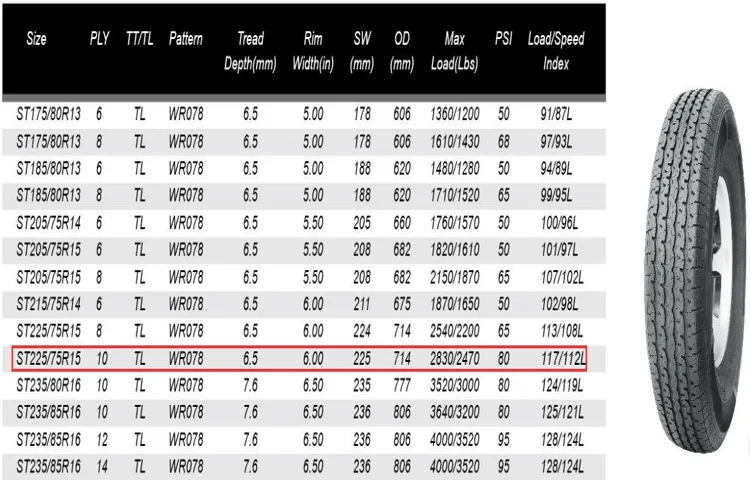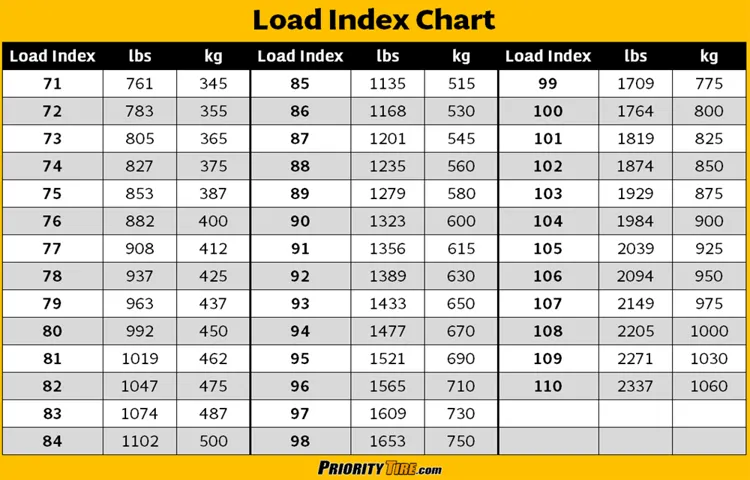Have you ever been unsure about which tires to choose for your trailer? It’s not simply a matter of finding the right size, you also need to consider the load range. The load range is the tire’s capacity to hold weight and understanding how to choose the right one can save you from potential disasters on the road. Think of it like this- just like Goldie Locks, you don’t want your tire’s load range to be too high or too low.
You want it to be just right. So, how do you determine the perfect load range for your trailer tires? Don’t worry, we’ve got you covered! In this post, we’ll provide you with all the information you need to make an informed decision and ensure you’re choosing the right load range for your trailer tires.
Table of Contents
Understanding Load Range Ratings
If you’re looking to purchase new tires for your trailer, it’s important to understand load range ratings. Load range ratings indicate the tire’s ability to carry weight under different conditions. The load range is indicated by a single letter on the tire’s sidewall, with higher letters indicating a higher load capacity.
For instance, Load Range C tires have a lower load capacity than Load Range E tires. To determine what load range you need for your trailer, you should first consider the weight of your trailer and its contents. Then, you should research the recommended load capacity for your specific trailer’s axle and tongue weight.
Choosing the correct load range rating can help ensure the safety and reliability of your trailer and its contents while on the road.
What is a Load Range Rating?
Load Range Rating Load Range Rating is a measure used to determine the maximum weight a tire can carry safely and efficiently. Each type of tire has a specific load capacity, and it is crucial to ensure that you choose the correct load range rating for your vehicle. The load range rating is usually indicated by a letter on the side of the tire, with “B” indicating the lowest capacity and “F” indicating the highest capacity.
It is essential to adhere to the recommended load range rating as overloading your tires can result in tire failure, and inefficient performance which could also lead to a higher gas cost or vehicle damage. Therefore, understanding your specific vehicle’s load range rating is paramount to ensure your safety and the safety of others on the road. Be sure to check your vehicle’s manual or consult a reliable tire professional to determine the right load range rating for your automobile to ensure a safe driving experience.

How is Load Range Rating Determined?
Load range rating is an essential safety feature that determines the maximum amount of load that a tire can handle based on its construction and size. It is a code assigned by tire manufacturers that indicates the weight capacity of the tire under specific conditions. Load range rating is determined by a tire’s ply rating, which refers to the number of layers of fabric or rubber used in its construction.
The more layers a tire has, the higher its load range rating. Load range ratings are essential for drivers who need to tow heavy loads or operate vehicles that carry significant amounts of weight. It helps ensure that the tire can support the vehicle’s weight safely and without compromising driving performance.
It is crucial to note that the load range rating only applies to the tire’s maximum weight capacity and does not necessarily indicate its durability or lifespan. For example, a tire with a higher load range rating may not necessarily outlast a tire with a lower one that is subjected to less stress. Nonetheless, understanding load range ratings is crucial for vehicle safety and proper tire selection.
What Load Range Ratings are Available?
Load Range Ratings Load range ratings are an important consideration when it comes to choosing the right tires for your vehicle. Each tire is rated based on its load carrying capacity, so it’s essential to understand what load range ratings are available. Load range ratings are given in letters that range from A to F, with each letter representing a different level of load carrying capacity.
The higher the letter, the greater the load capacity. For example, a tire with a load range of A can typically handle up to 1,102 pounds, while a tire with a load range of F can handle up to 3,748 pounds. It’s important to choose a tire with the appropriate load range rating for your specific vehicle to ensure safety on the road.
Additionally, it’s crucial to check your tires’ load range rating before buying them and to consider factors like your vehicle’s weight, the number of passengers, and the type of cargo you’ll be carrying to determine the appropriate load range rating. By doing so, you can ensure that your tires perform optimally and keep you safe while you’re on the road.
Factors to Consider When Choosing Load Range
If you’re wondering what load range tire you need for your trailer, there are a few factors to consider. The load range determines the maximum weight that the tire can hold, so it’s crucial to choose the right one for your trailer. First, you need to determine the gross vehicle weight rating (GVWR) of your trailer, which is the maximum weight that your fully loaded trailer can weigh.
Next, you need to consider the type of terrain you’ll be travelling on, as well as the weather conditions you’ll encounter. If you plan to travel on rough terrain or in extreme weather, then you’ll need a tire with a higher load range to ensure your safety. Finally, it’s important to consider the frequency and distance of your trips when choosing a load range.
If you plan to travel long distances frequently, then a tire with a higher load range will last longer and provide better performance. Overall, you’ll want to choose a load range that meets or exceeds the GVWR of your trailer and provides the necessary durability and reliability for your specific needs.
Total Weight of the Trailer and Cargo
When it comes to choosing the load range for your trailer, the total weight of both the trailer and cargo is one of the most important factors to consider. It’s essential to stay within the recommended load range of your trailer to ensure safe and efficient towing. Going over the load range can lead to tire failure, reduced handling and braking ability, and even dangerous accidents.
To determine the load range that’s appropriate for your trailer, you need to take into account the weight of the cargo and any additional equipment you’re carrying. You also need to consider the trailer’s weight, including the tongue weight and weight distribution system. It’s crucial to balance the weight distribution correctly to avoid problems such as swaying or fishtailing.
When in doubt, consult the manufacturer’s guidelines and consider getting advice from a professional. By carefully considering these factors and choosing the appropriate load range, you can ensure a safe and successful towing experience.
Number of Axles on the Trailer
When you are hauling cargo on a trailer, it is important to consider the number of axles on the trailer to ensure it can handle the load range. The more axles, the more weight the trailer can carry without putting too much strain on the tires and suspension system. Generally, trailers can have anywhere from one to three axles, with tandem and tri-axle trailers being popular choices for heavy-duty loads.
It’s also important to consider the weight distribution of the cargo and how it will affect the trailer’s stability on the road. If the weight is not evenly distributed, it can cause the trailer to sway or even tip over during travel. Always check the load capacity of the trailer and choose the appropriate number of axles to ensure a safe and efficient transport of your cargo.
Size and Type of the Trailer
When it comes to choosing the load range for your trailer, there are a few factors that you should consider. First and foremost, you need to think about the size and type of trailer you will be using. This will have a major impact on the amount of weight you can safely transport.
For smaller trailers, you may only be able to carry a few hundred pounds, whereas larger trailers can hold multiple tons. Additionally, you will need to consider the type of load you will be carrying. If you are transporting dense materials, such as metals or concrete, your load range will need to be lower than if you were carrying lighter items like furniture or clothing.
By taking these factors into account, you can choose the right load range for your trailer and ensure that you are operating safely and efficiently on the road.
The Importance of Choosing the Right Load Range
When it comes to towing a trailer, choosing the right load range for your tires is incredibly important. A load range refers to the maximum weight capacity that a tire can handle. If you don’t choose the appropriate load range tire for your trailer, you run the risk of causing a blowout or other tire failure on the road, which can be incredibly dangerous.
So, what load range tire do you need for your trailer? That depends largely on the weight of your trailer and the weight of the items you plan to haul. It’s essential to consult your trailer owner’s manual to determine the appropriate load range for your specific vehicle and application. By ensuring that you have the right load range tire for your trailer, you can help to ensure your safety on the road and avoid costly repairs or accidents.
Safety
When it comes to safety while towing, choosing the right load range is crucial. Choosing the wrong load range could result in tire failure and potential accidents. The load range of a tire is a measurement of its ability to support weight and withstand pressure.
It’s important to choose a tire with the appropriate load range for the weight you will be towing. Overloading your tires or using ones with a load range that is too low can cause the tire to overheat and potentially burst. It’s always better to err on the side of caution and choose a tire with a higher load range than necessary to ensure maximum safety on the road.
Remember, your safety and the safety of those around you are paramount, so always choose the right load range for your towing needs.
Durability and Longevity
Choosing the right load range is crucial when it comes to ensuring the durability and longevity of your vehicle’s tires. Load range is a rating system defined by tire manufacturers that indicates the weight that a tire can safely carry, with higher numbers indicating a greater carrying capacity. Choosing a load range that is too low can result in tire damage or failure, while choosing a load range that is too high can lead to a harsher and rougher ride.
So, it’s essential to select the right load range that matches your vehicle’s weight and intended load. By doing so, you can maximize your tire’s lifespan and avoid the added cost of premature tire replacements. Remember, just like how choosing the wrong type of shoe size can lead to foot problems, selecting the wrong load range can lead to tire problems.
So, always consult with a tire professional to ensure that you choose the right load range for your vehicle, and never compromise on safety.
Conclusion
In general, the load range tire you need for your trailer will depend on several factors such as the weight of the trailer, the type of cargo, and the intended use. It’s crucial to select the right tire with the appropriate load range to ensure a safe and smooth ride. Remember, choosing the right tire is like finding the perfect partner – it should be reliable, durable, and able to carry your load with ease.
So, don’t settle for less and invest in the right load range tire for a secure and effortless towing experience.”
FAQs
What is load range for a trailer tire?
Load range for a trailer tire refers to the amount of weight it can carry safely at a certain pressure. The higher the load range, the more weight the tire can carry.
How do I determine the load range I need for my trailer tire?
To determine the load range you need, you’ll need to know the weight of your trailer and the load capacity of each tire. You can check your trailer’s manual or consult with a professional to find this information.
What are the load range options for trailer tires?
Load range options for trailer tires typically range from B to F. Each load range corresponds to a different weight capacity, so it’s important to choose the right one for your specific trailer.
Can I use passenger car tires on my trailer?
It is not recommended to use passenger car tires on your trailer because they may not have the load capacity necessary to safely carry the weight of your trailer and its contents.
What is the difference between bias ply and radial trailer tires?
Bias ply trailer tires have a stiffer sidewall and provide better stability under heavy loads, but can wear unevenly. Radial trailer tires have more flexibility and provide a smoother ride, but may heat up quicker under heavy loads.
Can I mix and match load ranges on my trailer tires?
It is not recommended to mix and match load ranges on your trailer tires because it can affect the handling and stability of your trailer. It is best to use tires with the same load range on all wheels.
How often should I replace my trailer tires?
It is recommended to replace your trailer tires every 3-5 years, regardless of mileage, to ensure they are in good condition and have not degraded due to age or exposure to sunlight and weather.



